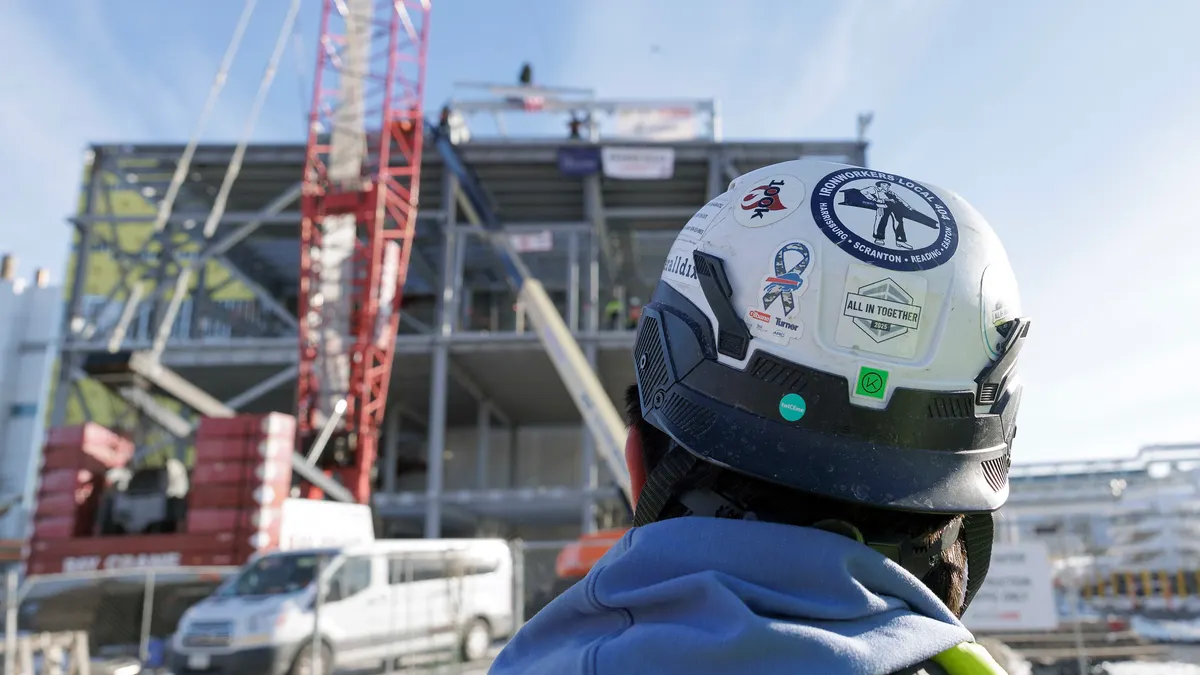This article is part of our six-part series of interviews with women leaders in construction for Women in Construction Week 2017. Read the others here.
When Marine Corps veterans Amber Peebles and Melissa Schneider learned about the federal government's program directing a portion of contracts for service-disabled, veteran-owned businesses, they saw a prime opportunity to get in the construction game.
In 2003, Schneider started Athena Construction. Then, in 2008, Peebles came on board as president of the women-owned, veteran-owned, HUBZone business. The company, which has grown to a staff of 35 employees and has three offices, in Virginia, New Orleans and San Antonio, operates as a general contractor as well as a specialist in door, frame and hardware installation.
Peebles said she and Schneider, the company's vice president, have succeeded in the construction industry by applying a similar mindset to construction projects as they had in the Marine Corps. A strong advocate of mentoring programs for underrepresented groups in the industry, Peebles encourages women with strong problem-solving skills to consider a career in the exciting, yet risky, business of construction.
Construction Dive spoke with Peebles about her experience starting Athena with Schneider, the benefits of partnering with larger contractors and her approach to tackling the constant problems that emerge on a job site.
Editor's note: This interview has been edited and condensed.
How did you get started in construction?
PEEBLES: My first exposure to construction was when I was a law firm administrator, and I was the daily client contact for a major renovation and build-out that we were undergoing as part of a merger. It was about a $20 million renovation. Simultaneously, my best friend happened to own a construction company doing residential work. And the third thing was that under the Bush administration, there was a law enacted giving a set-aside for 3% of federal contracts going to service-disabled veteran-owned businesses.
Both myself and my business partner are Marine Corps veterans. She and I put our minds together and thought, 'You know, why don’t we become one of the only, if not the only, service-disabled veteran, women-owned construction company doing federal work?' We joined forces back in 2008. From that point forward, we started pursuing federal projects.
How has your experience in the Marines translated to the construction industry?
PEEBLES: I rely very heavily on my Marine Corps background to be successful in construction. It’s a mindset. In the Marine Corps, you simply do not have the latitude to fail. And you have to find a way to accomplish the mission. That is exactly the same mindset we bring to our construction company.
Athena often partners with larger general contractors on projects. How have you used those partnerships to succeed and grow?
PEEBLES: Obviously on these incredibly large public works projects, we’re too small to perform that [work], but we will perform as a subcontractor to the large primes. We get experience and expertise on some of the most sophisticated and demanding projects in the country. That gives us a competitive advantage when we’re a prime contractor on much smaller jobs because we have been exposed to some of the most cutting-edge and sophisticated project management practices and construction technologies.
What projects are you the proudest to have worked on?
PEEBLES: Walter Reed Medical Center, really all our hospital work. Our [work in that sector] has been for Wounded Warriors, Walter Reed, Audie Murphy Hospital in San Antonio, and we just completed our scope on the new construction at the Veterans Affairs replacement hospital in New Orleans.
What was the first project you worked on as Athena?
PEEBLES: It started out as residential, but I don’t even want to go down that path. The first federal project of any significance that we did was at the National Geospatial Agency as a subcontractor to Clark Construction.
Was it difficult to transition from residential sector to large-scale federal projects?
PEEBLES: We were happier than hell to get out of residential. It was a completely different animal. We like federal because the rules are the rules. Because we’re Marines, we always endeavor to play by the rules. It makes for a level playing field. It’s not the same in residential.
What has your experience been as a woman in a male-dominated field?
PEEBLES: It’s got it’s good and it’s got it’s bad. I always like to focus on the good. When you work for a good prime contractor, they can see how sincere and how earnest you are about being part of the team and helping bring a project through successfully.
And what about the bad?
PEEBLES: There are never enough clean port-a-johns.
Have you found that when you manage a project, you have to overcome expectations?
PEEBLES: I think that in my experience, women have always been held to a higher standard than our male counterparts. Always.
Why is there a shortage of women in the construction industry?
It’s not a particularly attractive industry if you don’t know a lot about it. Everybody thinks of construction as dirty — and it is — dangerous — and it is. A lot of times, you have to move. You have to go where the work is, and that’s not necessarily ideal for a lot of folks. Women have to make choices. Sometimes they have to choose between career and family, so it may not be the most attractive career. I think for the women who are in it for a career and are good at it, they really enjoy it.
Construction is also an incredibly risky business. Women, by their nature, typically are geared toward mitigating risk. They’re risk-averse. I’m not saying that’s a bad thing or a good thing. But construction is a really risky business.
How can the industry can attract more women?
PEEBLES: Mentoring. I think senior executives in the construction industry need to make themselves far more available to individuals or groups of individuals who would not necessarily be considered the typical player in construction.
What advice would you give to younger women starting out in construction?
PEEBLES: Learn something new every day, and meet someone new every day. This is a very relationship-driven business, and you have to bring value to the table. You have to bring a knowledge or skill set or a connection to help be successful.
Construction is all about problem-solving. If you want to be successful in construction, become an incredible problem solver.
How did you develop strong problem-solving skills?
PEEBLES: Throughout my life, to include my time in the Marine Corps, I continuously and daily honed my problem solving skills. Construction was an appropriate endeavor for me to go into because there’s not one day out there that you don’t anticipate what could be a problem and resolve it before it becomes a problem, or you’re faced with a problem that you have to find a workaround. Whether it’s a supplier who can’t meet a material delivery, or if it’s an employee, or a subcontractor, or a weather delay, or a design flaw, or an unreasonable owner or contracting officer, there’s always a problem to solve.




















